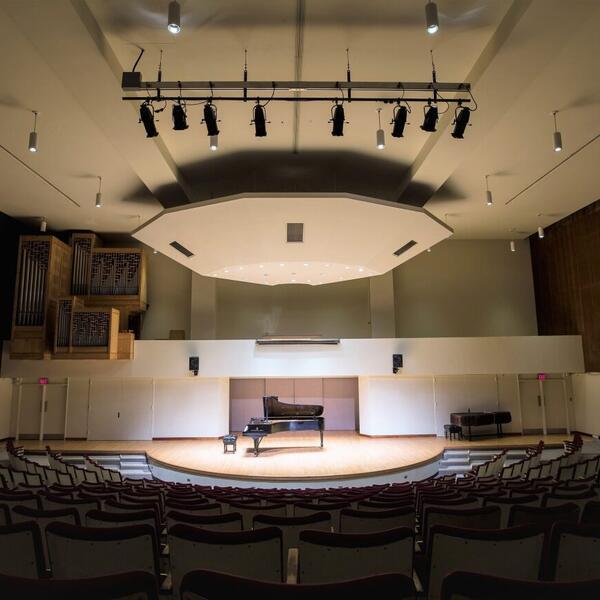Grad Audition Information
Auditions
Applicants to MMus and DMA performance degrees must also pass an audition, which are held in February. Please review the audition requirements carefully.
All DMA programs, and some MMus programs, require a pre-audition to be submitted via direct link on the Audition Program on the application portal. Please see the repertoire requirements below to check if your program has a pre-audition. If you have any questions regarding repertoire, please contact the Area Head for your instrument/program area.
A warm-up room will be provided 30 minutes prior to your audition time. If you need an accompanist for your audition, please contract grad.music@utoronto.ca to request a list of local accompanists.
Applicants are responsible for contacting and paying their accompanists.

Audition Dates
| Date | Details |
|---|---|
| December 5, 2025 | Audition program due. Pre-audition video recordings due. Requests for recorded auditions (eligible MMus applicants) due. |
| Mid-January | Pre-audition results available. In-person audition schedule available. |
| February | Instrument specific auditions take place. TBA: Brass, Historical Performance, Organ, Woodwinds |
| January 31-February 1, 2026 | Jazz auditions |
| February 9, 2026 | Orchestral Conducting auditions |
| February 10, 2026 | Choral Conducting auditions |
| February 14, 2026 | Applied Music and Health auditions Percussion auditions |
| February 14–15, 2026 | Piano and Piano Pedagogy auditions Strings auditions |
| February 17, 2026 | Accordion auditions Collaborative Piano auditions Guitar auditions |
| February 18-19, 2026 | Voice and Vocal Pedagogy auditions |
February 18, 2026 February 20–21, 2026 | Opera auditions |
| April 1–30, 2025 | Audition results available |
Audition Requirements
All applicants must submit their full audition program using the Audition Program Template (available on the application status portal) as part of their supporting documents (deadline Friday December 5, 2025).
Pre-auditions
All DMA programs, and the MMus Conducting, MMus Jazz, MMus Historical Performance (Voice), MMus Voice, MMus Vocal Pedagogy, MMus Opera programs have two (2) rounds of auditions:
A pre-audition recording is to be submitted by the document deadline (Friday December 5, 2025). A direct link to an unlisted YouTube playlist with the pre-audition recording must be included on the Audition Program Template and uploaded in the graduate application portal. Pre-audition results are available in early January. See repertoire requirements, and recording guidelines, below.
Based on the Admission Committee’s assessment of the pre-audition video, applicants may be invited for the full in-person audition. In-person auditions are typically held in mid-February. A schedule of dates will be available later in the fall.
All applicants must submit their full audition program (for both rounds of the audition) using the Audition Program Template. The Template is available for download on the "Application Status" page of the graduate application portal, and must be uploaded as part of the supporting documents (due by Friday December 5, 2025). See the repertoire requirements for your instrument below.
Recorded Auditions
MMus applicants (Applied Music and Health, Historical Performance (Instrumental), Instrumental, and Keyboard) who reside within 500 km of Toronto must audition in-person. Applicants for these programs who reside more than 500 km from Toronto may submit a recorded audition; however, all applicants are strongly advised to come for an in-person audition. To request a recorded audition, applicants should complete the online form available on the Audition Program Template by December 5, 2025. We will not be able to adjust your audition method after December 6. All requests for recorded auditions must be received by this point.
The deadline to submit recorded auditions is January 19, 2026, and selected applicants may be invited for a Zoom interview in late February. Recorded auditions must include both video and audio and be of good sound quality. (See the Recording Guidelines below for tips and best practices.) Applicants will receive the recorded audition submission link by email.
All DMA applicants, and MMus applicants with a pre-audition, who are invited to the full audition are expected to audition in person.
Recording Guidelines
- Ensure that you have met the pre-audition repertoire requirements for your instrument (below), if applicable
- Ensure that the audio is of good quality.
- Recordings should be no older than September 1, 2025.
- The applicant must appear centred in the video frame.
- The video should be shown in full profile with face, hands and feet visible at all times. For instrumentalists, the head and both hands must be clearly visible. For singers, the applicant must face the camera directly and the upper body and face must be visible.
- Unless otherwise stated, each piece of repertoire may be recorded separately, then combined into one video, or they may be listed on one playlist on an unlisted YouTube channel.
- There must be no editing within individual pieces or movements. For pianists, multi-movement works should be recorded in one take.
Repertoire
Have a question?
The Faculty of Music Graduate Office is a great resource for more information about the graduate application process.